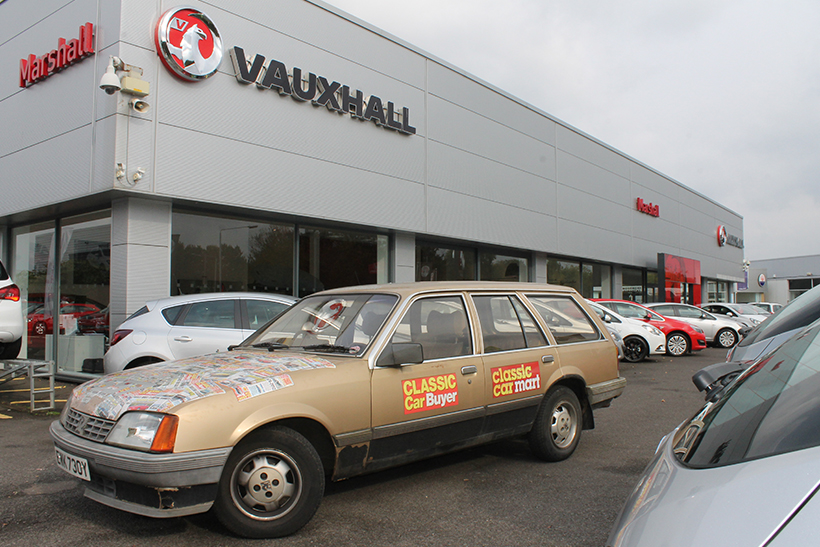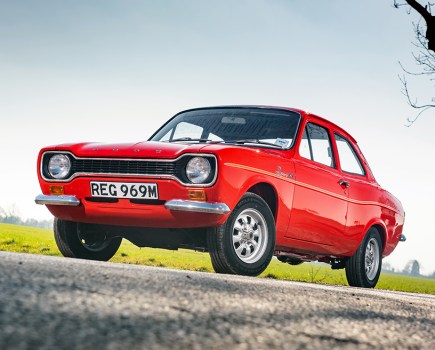Vauxhall has brought its Scrappage Allowance scheme back for another month – leaving roadworthy pre-1991 classics vulnerable once more.
Keen to calm the nerves of enthusiasts, Luton has stepped in and promised that classics too good for the weighbridge will be offered to owners’ clubs.
“The Vauxhall scrappage programme is not designed to rid the world of classic cars,” a spokesperson explained. “As a result, Autogreen, Vauxhall’s recycling partner, will identify any cars manufactured prior to 1991 that are presented through the scheme and inform Vauxhall’s Luton HQ. Relevant owners’ clubs will then be notified, giving them the opportunity to purchase parts through the Authorised Treatment Facility,” they confirmed.
SAFE AND SOUND?
Last year, Vauxhall’s Scrappage Allowance scheme, then (as now) a manufacturer funded initiative with no government backing, angered classic car fans when dealerships used historic vehicles to advertise the programme.
The backlash resulted in Drive Haverhill Vauxhall giving away a 1988 Austin Maestro it had planted in a skip to Austin-Rover aficionado and classic car journalist Calum Brown – who remained unimpressed by Vauxhall’s actions. “I find it shameful really that a company can be so hell-bent on making sure bland, characterless vehicles are on finance with young people, who could never usually afford a new car. This robs us of the classic cars younger drivers would otherwise have in their grasp,” he rued. His restoration of ‘Skippy’ continues: in late March and early April, the Maestro appeared on the Federation of British Historic Vehicle Clubs’ (FBHVC’s) stand at the Practical Classics Restoration Show.
Dumping older vehicles in skips is nothing new; the 2009 Scrappage Scheme saw similar promotional stunts by dealerships. Classics World snapped a Volkswagen dealer advertising the scheme, then backed by the government, using a MkII Golf in a painted skip.
Then, as now, anti-scrappage sentiment ran high – forcing one Scottish MINI dealership to remove its scrappage-stickered Mini Sportspack after a deluge of complaints from Mini fans. In 2015, a petition to break 2009 Scrappage victim cars stuck on Thurleigh Airfield in Befordshire was unsuccessful.
A ‘SAFETY NET’
Vauxhall’s stance towards Scrappage classics hasn’t changed from last time – it was willing then for dealerships to work with enthusiasts and owners’ clubs to save worthy cars from the frag. It remains adamant that Scrappage Allowance exists primarily to take borderline old cars off the road rather than chip away at the numbers of classic vehicles on the road. Previous runs of Scrappage Allowance netted so few classics that Vauxhall didn’t think the message needed hammering home.
“I don’t think we’ve seen a really nice ‘classic’ pitched in for a new car so a full buyback opportunity would be rare,” explained Denis Chick, Vauxhall’s director of communications last year. “In the unlikely chance that a classic in good condition, with a value, should turn up, the dealer would probably buy it directly from the customer and save it as they are in the informed position to make that judgement,” Denis continued.
“Car retailing is complex, we don’t have the systems in place to manage a buyback for the rare occasion it may happen, dealers will simply use their knowledge and common sense. These days, classic prices are rising for pristine and even moderate examples of classics and the owners know their value. There are also many cars out there that are mediocre and will never be collectable. Whichever way, we are pretty confident that the system will catch the good ones should they appear but, I repeat, it will be very much the exception,” Denis concluded.
In 2017, Vauxhall wants to make its position absolutely clear: “Vauxhall has immense respect for the UK’s classic car groups, irrespective of what make or model they support,” added Simon Hucknall, PR manager for Vauxhall Product and Heritage. “The Scrappage Allowance is designed to capture vehicles that are beyond economical repair, and given the low value of scrap metal, recycling of parts is vital to the scheme’s viability. We’re also confident that the number of genuine classics over 25 years old presented to the scheme will be minimal, especially given the steady rise in value of even the most mainstream collectors’ cars in recent years. But if we do see any, our ‘safety-net’ will ensure that classic car owners and clubs will benefit.”
Is the wastage of even one eligible classic suitable to sell a few more cars? Classics World thinks not. That said, at least enthusiasts and car clubs get a chance to save classics from destruction; at the end of the day, none of us want to see usable classics and spares rotting away on airfields.






